Nell Scovell Talks About The Groundbreaking Sabrina, The Teenage Witch
Posted on October 4, 2021 at 12:13 pm
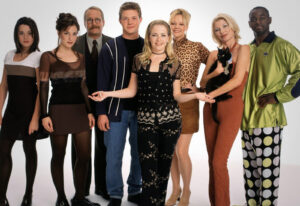
Posted on October 4, 2021 at 12:13 pm

Posted on July 15, 2021 at 4:06 pm
A-| Lowest Recommended Age: | Middle School |
| Profanity: | Strong language and explicit references to anatomy |
| Alcohol/ Drugs: | Alcohol |
| Violence/ Scariness: | Mild comic peril, gun |
| Diversity Issues: | None |
| Date Released to Theaters: | July 16, 2021 |
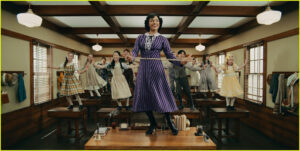
Cecily Strong (“Saturday Night Live”) and Keegan-Michael Key (“Key and Peele,” “Keanu,” “Prom”) play surgeons who meet by a hospital candy machine and fall for each other. A few years later, their relationship is under some strain when they go on a couples hiking retreat. Lost in the rain, they happen on a cheerful 19th-century town where the citizens burst into song and elaborately choreographed dance numbers. They’re told by a magical leprechaun (Martin Short) that they cannot leave until they find true love.
The people they meet include Mayor Menlove (Alan Cummings), whose name could be a clue to his clear discomfort in a heteronormative community. Further discomfort could be the result of his dominating, judgmental wife Mildred (Kristin Chenoweth). (Compare them to Mayor Shinn and his wife Eulalie Mackecknie Shinn in “The Music Man.”) There’s the rapscallion carny Danny Bailey (Aaron Tveit). (Think Billy in “Carousel.”) and the teacher in the one-room schoolhouse, who lives with her lisping little brother (similar to Marion and Winthrop Paroo in “The Music Man”). Later on, they meet a beautiful blonde countess (Jane Krakowski) (compare to the Baroness in “The Sound of Music”) and a handsome, widowed doctor (Jaime Camil, a bit of Captain von Trapp). And there’s a pappy with a shotgun that he uses to protect his nubile young (how young?) daughters, including Dove Cameron as Betsy (maybe Daisy Mae in “Li’l Abner”).
Writers Ken Daurio and Cinco Paul are clearly the nerdiest of theater kids at heart and every bit of the series is imaginative, tuneful, thoughtful and detailed. Look behind the schoolteacher at the schedule of parent-teacher conferences on the blackboard. All the names are famous musical-creators. Some of the musical numbers are in direct conversation with classics, like Mildred’s solo, a witty riff on “Music Man’s” “Trouble.” Others are romantic or just pure fun.
Whether you are a theater nerd who can trace the history of the first act “I Want” song from “Show Boat” to “The Little Mermaid” or are just looking for a clever, warm-hearted, romantic adventure filled with supremely talented people giving their all, “Schmigadoon!” is one of 2021’s most delicious delights.
Parents should know that this movie has sexual references including out-of-wedlock pregancy and explicit language about reproduction and body parts, as well as relationship stress, strong language, and some alcohol.
Family discussion: What’s your favorite musical and why? What did Josh and Melissa learn about love?
If you like this, try: the musicals that inspired it as well as others like “My Fair Lady,” “Once Upon a Mattress,” “Bells are Ringing,” “West Side Story,” and “The Pajama Game”
Posted on March 29, 2021 at 7:00 am
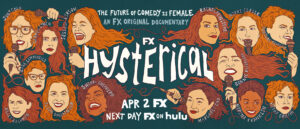
“Hysterical” is a new documentary about female stand-up comics premiering April 2, 2021 on FX. Director Andrea Nevins (Tiny Shoulders: Rethinking Barbie), journeys backstage and on the road with veteran comedians, rising stars and novices to discover how an intrepid group of boundary-breaking females are changing the game and exploring what it takes to become the voices of their generation and their gender, featuring Kelly Bachman, Margaret Cho, Fortune Feimster, Rachel Feinstein, Marina Franklin, Nikki Glaser, Judy Gold, Kathy Griffin, Jessica Kirson, Lisa Lampanelli, Wendy Liebman, Carmen Lynch, Bonnie McFarlane, Sherri Shepherd and Iliza Shlesinger.
I was lucky enough to attend a press conference with Nevins and some of the comics featured in the film, where new talked about “cancel culture,” hecklers, turning real life into comedy, and why no one should film their acts with their phones. Some highlights (lightly edited for clarity):
Adapting — or apologizing for past jokes that are now considered inappropriate:
Judy Gold
It was way different, and I think it’s because we thought differently then. So, things that were funny then, because of the way we’ve evolved, aren’t as funny now. If you take the way we think now and apply it to some comedy from 30 years ago, you’ll say, “Oh, that’s not funny. Why are they laughing?” It was a different world. I personally never really edited myself, but my rule is that you can talk about anything, any topic no matter how horrible as long as it’s funny. You have to craft a joke about it. You can’t just spew racial epithets or stereotypes. You need to use them wisely. And, also, if you are talking about something horrible that happened and you are crafting a joke about it, it doesn’t take away the sadness and the horror. It actually acknowledges that it happened, and you are sort of finding — a joke is a buildup of tension and then a release, and oftentimes people — you know, I think it’s going to happen with COVID — people are so tense, and they want a release. They want to laugh. They want to say, “Oh, I needed that.” It doesn’t make it — it doesn’t make you a bad person. It doesn’t cheapen whatever, you know, the topic is.
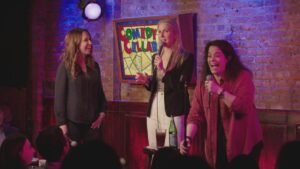
Bonnie McFarlane
I think everybody has jokes that you feel guilty about. I have a joke where I say “tranny,” and it still gets played on Sirius, and it makes me cringe so hard. But it wasn’t, like, negative in that way,
but it’s still using a word that I would never use now. So, we learn. We grow. You are making jokes about the times that you are living in, and that’s all you can do. You can’t see into the future about what’s, you know — maybe there will be a time where we are not allowed to make fun of dogs.
Sheri Shepherd
I mean, what I find is very hard is, in the past — you know, it’s always an evolution of being a stand-up comic, and in the past, you said what you said in the past because that’s where you were then. What I find very troubling now for comics is we are not allowed to say anything. You get on that stage, and that was the thing. With comics, we were the one that told the emperor that he was not wearing any clothes, and we were the ones that were allowed to get on stage and say something. Like Judy said, as long as it was funny, go ahead and put it out there. But now, as a comic, getting on stage, what I am tired of dealing with is “Oh my gosh. That was offensive to me.” “Oh my gosh. You said this.” Look, I’m a comic. The way we view the world is in a very skewed — through a very skewed filter. That’s what makes us get on this frickin’stage every night and say what we say. So that’s what I find
troubling for us in what we do today in this world, that if you say something, you’ve got to be scared that now you are not going to get booked or that TV show is going to come on, and you are going to go, “yeah, you know, you offended three people, and now they are writing letters.”
Jessica Kirson
I don’t feel guilty for material I’ve done in the past because I know it always has come from a loving place and because, at the time, I felt like it was okay. And there’s things I don’t do now or say now because I don’t feel it’s right and it feels wrong, and I don’t do it anymore. There’s times when I’ve said stuff to audience members where I felt guilty because I felt like I was too harsh or said things that I regret, but I’ve said things at the time that I felt were appropriate. And, again, there’s things I censor myself with now because, in my gut, it feels wrong to say them.
Bringing your painful experiences to the audience
Sherri Shepherd
When you are going through something painful or difficult and you bring it up on stage, there’s a chunk of the audience that can relate to it because they’ve gone through it. My husband cheated on me and the girl got pregnant. And I talk about standing over him, and I was ready to bash his head in with a lamp, but because I got it from Target, it wasn’t heavy enough to kill him. And that’s when I realized, that’s why white people buy antique lamps, because the base will actually crush a skull.
The sheer number of women that came up to me and went, “I hurt so bad from infidelity, and the fact that you were able to talk about it and make me laugh about wanting to kill my husband and what I’m going through,” I think it’s freeing for some people to be able to laugh at it. And the more authentic you are about your life, the less people can steal your stuff because it’s authentic to you.
Carmen Lynch
New York is great too because we are all in therapy. So, it’s a very therapy-centric place. So, we just take that stuff, and we throw it on stage. And it feels good, but it’s also original material, and people can relate.
Marina Franklin
It’s also very healing. It’s a healing journey. I mean, for me, that was the first time I ever had to talk about the fact that I could possibly die . But it was moments like that that you realize that you were always meant to be a comedian too because when you have real intense moments like that and you can make people laugh with it and it makes you feel good and it makes them feel good — because you constantly go through this stage of wondering if you are actually that comedian, and moments like that, it self-validates. I don’t know if that’s a word, but that’s what it felt like. And it was amazing to have a young woman approach me and say, “Thank you for doing this because people don’t know that people going through breast cancer and treatment, that they laugh and that we need laughter. And I brought my friend to your show just so she could see it.” And, so, it becomes this community that can laugh with you.
Posted on October 1, 2020 at 8:00 am
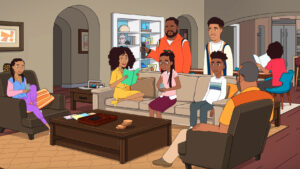
ZOEY (VOICED BY YARA SHAHIDI), RAINBOW (VOICED BY TRACEE ELLIS ROSS), DRE (VOICED BY ANTHONY ANDERSON), DIANE (VOICED BY MARSAI MARTIN), JACK (VOICED BY MILES BROWN), JUNIOR (VOICED BY MARCUS SCRIBNER)
The Johnsons and “black-ish” return to ABC with a one-hour television special on Sunday, October 4 (10:00-11:00 p.m. EDT), on ABC. The two back-to-back episodes, which will air ahead of the official season seven premiere on October 21 (9:30-10:00 p.m. EDT), follow the Johnsons as they navigate the upcoming election, with Junior (Marcus Scribner) embarking on his journey as a first-time voter and Dre (Anthony Anderson) launching an exploration into local politics. The director is Oscar® winner Matthew A. Cherry (the adorable “Hair Love”).
In “Election Special Pt. 1,” (10:00-10:30 p.m. EDT), Junior is excited for his first time voting but discovers he has been purged from the voter polls so he does a deep dive into why – trying to understand the systems in place for voter registration.
Then, in a special animated episode, “Election Special Pt. 2,” (10:30-11:00 p.m. EDT), Dre’s colleague Stevens (Peter Mackenzie) makes an ill-advised decision to run for Congress, so Dre enlists his family’s help and campaigns against him but gets caught up with fundraising and private interest groups. “Election Special Pt. 2” is directed by Matthew A. Cherry and written by Graham Towers & Ben Deeb.
The animation is produced by Jonas Diamond, Executive Producer and Co-Owner of Smiley Guy Studios and Rod Amador, Executive Producer and Co-Owner of Big Jump Entertainment.
In its upcoming seventh season, “black-ish” will continue to tell stories that shine a light on current events through the lens of the Johnson family, addressing the global pandemic, systemic racism and the movement for social justice and equality.
Posted on September 8, 2020 at 12:01 pm
One of my favorite cultural critics, Mark Harris, has an uncharacteristically personal take on the cop shows he watched, some as a way to connect to his father, when he was growing up, from “Adam-12” to “The Mod Squad” to “Kojak.” He talks about his own experience and perspective as well as what, looking at them now, he sees about the way law enforcement has been portrayed in the media and how it has shaped our ideas. It’s one of the most illuminating pieces of cultural criticism of the year.
And then, at night, the TV would go on and I would be transfixed by the cops I saw there, the men who seized a piece of my consciousness when it was at its most impressionable, captured my imagination, and made me believe in their effectiveness….I needed a better connection to my father than I had, and the one I found was Adam-12, a series that was, in a way, designed with almost insidious perfection as My First Police Show — a smooth transition from kids’ TV into the grown-up world. For one thing, it was only 30 minutes; for another, that half-hour was usually divided among two or three bite-size, easy-to-follow, often amazingly uneventful stories of two white cops on the beat in Los Angeles (a city as exotic as Mars to a child who had never been west of New Jersey)….
In an era when all TV shows have age-suitability ratings and content guides, the vigor with which adult cop shows of the 1970s were marketed to children seems shocking. But in fact, immense energy was invested in embedding those series in the collective consciousness of children. Dell published 15-cent Mod Squad comic books, and Topps sold Mod Squad chewing gum. You could get a wheel of Hawaii Five-0 Viewmaster slides and click through color pictures of unsmiling, black-suited Steve McGarrett arresting Honolulu’s miscreants, or buy Milton Bradley board games based on Columbo, Starsky & Hutch, or Kojak (“Be a part of thrilling police action on the city streets”), which allowed young players to use informants to track down a suspect hiding in a building. I coveted the Adam-12 lunchbox, which had an illustration of Malloy and Reed helping a little boy on one side and on the other the two of them crouching with their pistols drawn, ready to fire on an unseen suspect. The images were two halves of the same coin.
The Mod Squad was largely goodhearted, but in a way that made clear that the parameters of what constitutes a good heart were defined entirely by its white writers and producers. If the show were on now, it would be in sympathy with the Black Lives Matter protests, but it would single out those who lit fires and threw bricks as people who don’t truly believe that Black lives matter, and it would definitely not endorse defunding the police, because without the police, who would be able to explain all of this to the young people? Cops knew everything, could solve everything, could protect everyone … if you would just let them do their work.
Not all cops” was the baseline ethic of shows like Kojak; they would occasionally critique a policeman, but not policing. These series were “knowing,” they were savvy, and their cynicism seemed to spread in all directions at once. The vibe was, We’re not gonna pretend that some criminals aren’t Black, and we’re not gonna pretend that some cops aren’t racist, and most of all, we’re not gonna pretend that this is a nice place to live or that anything about it can be fixed.
Highly recommended.